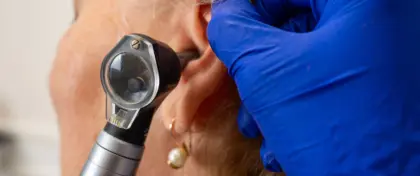
How to Know If Your Hearing Loss Is Temporary or Permanent
Have you noticed your hearing isn’t quite what it used to be? Whether conversations feel harder to follow or the TV volume keeps creeping higher, hearing loss can be concerning. But how can you tell if it’s temporary or permanent? We’ve broken down the key types, causes, and what you can do to protect your hearing.
Types of Hearing Loss
Hearing loss generally falls into three categories:
- Sensorineural Hearing Loss: The most common type, caused by damage to the inner ear or the nerves that send sound signals to the brain.
- Conductive Hearing Loss: Results from blockages or issues in the outer or middle ear, such as earwax buildup, infections, or physical obstructions.
- Mixed Hearing Loss: A combination of sensorineural and conductive hearing loss.
What Is Temporary Hearing Loss?
Temporary hearing loss means your hearing is reduced for a short period, often improving once the underlying cause is treated.
Common Causes of Temporary Hearing Loss
- Head Injuries: Trauma from accidents or sports can cause brief hearing changes.
- Blocked Ear Canal: Ear infections, wax buildup, or foreign objects can block sound.
- Swimmer’s Ear: An infection of the outer ear canal leading to pain and temporary hearing issues.
- Certain Medications: Some drugs, including aspirin or malaria treatments, may temporarily affect hearing.
- Tinnitus: Ringing or buzzing in the ears that sometimes causes hearing changes.
- Loud Noise Exposure: Sudden loud sounds (like explosions) may cause temporary hearing loss, though repeated exposure can lead to permanent damage.
How Long Does Temporary Hearing Loss Last?
It varies — from a few hours to several days — depending on the cause. If due to an infection or blockage, treatment usually restores hearing. If you notice hearing loss, it’s important to seek help promptly.
Understanding Permanent Hearing Loss
Permanent hearing loss, often sensorineural, involves irreversible damage and usually requires hearing aids or other support.
Common Causes of Permanent Hearing Loss
- Age-Related Hearing Loss: Gradual decline as we age, which may affect communication and cognitive health if left untreated.
- Health Conditions & Malformations: Conditions like Ménière’s disease or birth defects can impact hearing.
- Ototoxicity: Damage from certain chemicals or medications harming the inner ear.
- Long-Term Noise Exposure: Jobs or environments with loud noise can cause lasting damage.
How to Tell If Your Hearing Loss Is Temporary or Permanent
Track your symptoms and any changes in your hearing carefully. Sharing this information with a hearing specialist helps determine whether your loss is likely temporary or permanent.
Tips to Protect Your Hearing
- Avoid Loud Noises: Use ear protection or limit exposure to sounds above 85 decibels.
- Be Aware of Medications: Some medicines affect hearing; consult your doctor before stopping any prescriptions.
- Know Your Family History: Genetics can play a role in hearing loss risk.
- Schedule Regular Hearing Checks: Especially if you work in noisy environments or have existing hearing concerns.
Need Help With Your Hearing?
If you’re noticing changes in your hearing, don’t wait. Early diagnosis means better outcomes. Contact our hearing care experts today, book a free in-store hearing check, or try our quick and easy online hearing test to find out how well you’re hearing right now.
Book a FREE Hearing health check
📞 0800 054 8458
🖥️ Book Online
